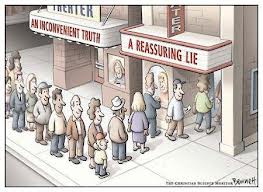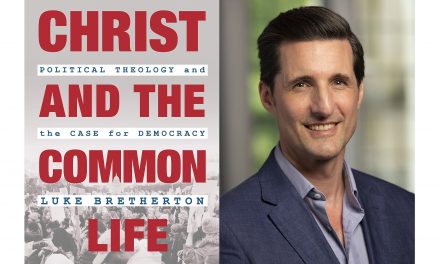I have recently been completing a manuscript for a parish-level primer on Catholic theology and the environment. I have to admit, there have been depressing moments when I’ve basically thought, “This society is a big, unsustainable mess” – a mess that has gotten way out of whack and is treated with almost comical ignorance in our politics. One report indicates that global carbon emissions, far from being on track for the 80% reduction that most scientists believe is necessary by 2050 to prevent disastrous warming, are going to increase by 37%. Meanwhile, legislators attempt to block even the meagre lightbulb efficiency standards on grounds that preventing people from buying the lightbulb of their choice is an affront to our way of life. The problem, I think, comes down to a simple rejection of what is really at stake: hedonistic, overconsumptive lifestyles that have to change. Pope Benedict writes that abuse of nature by humanity “invites contemporary society to a serious review of its lifestyle, which, in many parts of the world, is prone to hedonism and consumerism, regardless of their harmful consequences.” (Caritas in Veritate, 51) Americans lead the world in categories like meat consumption and fossil fuel consumption – if the pope does not mean us, then who does he mean?
But the recent kerfluffle over Mike’s Huckabee’s embarrassing remarks about women and the HHS mandate made me realize an important connection about the current Catholic problem of engaging in political action around any issue: Catholic positions, whether on the environment or on the mandating of 100% contraception coverage, rest on claims about the public relevance of certain actions that the society – regardless of party – really cannot even accept as public issues.
What do I mean? Here is a classic combox contribution in response to the Huckabee story: “it boils down to the difference in the parties, the GOP believe the government owns a woman’s uterus, the Democrats believe the woman owns her own body.” Notice how, if this were a story about cars or lightbulbs, you could just replace the topic, flip the parties, and the sentence would make total sense. Both parties relentlessly push this binary of government control versus individual freedom. The illusion created here is twofold. One, it’s a clear misstatement of the other’s position (almost no one is purely libertarian or purely totalitarian!). But more importantly, the binary is essential for both sides to maintain the illusion that we are having an important, rational debate about public policy.
In fact, what is happening is that both sides are refusing to talk about what the real issues are. On the HHS mandate, just as is the case with abortion, the core issue on both sides is sex. The simple facts that sex is procreative, that we as a society are not going to abandon babies on the streets, that decisions to have sex are influenced by social structures and their messaging – not to mention a whole literature discussing issues like the effects of single parenting, the economic problems faced by blue-collar workers trying to maintain stable partnerships, and the psychological problems of a hook-up culture – none of these are frankly and openly acknowledged. Because we would clearly then have to acknowledge that sex is not merely a private decision. Sex is not simply private.
As an aside, I should note that a recent piece on income inequality by Joe Klein tries to break through this impasse. He writes:
If the Democrats want to be serious about income disparity, they’re going to have to address the problems not just at the top of the social spectrum but also at the bottom–the explosion of single-parent families and out-of-wedlock births that have caused the bottom to drop out of working-class-family incomes. If the Republicans want to be serious about middle-class stagnation, they’re going to have to address the plutocratic clot at the top. They’re going to have to address the subtle, almost surreptitious regulatory and tax-code tilt toward the financial sector over the past 40 years–especially its gamier casino aspects.
Klein’s article is not an attempt to villanize any one practice or group, but instead to explain how a “faux populism” (whether on the Left or the Right) tends to ignore problems that would unnerve its core constituencies. He could go further and recognize that these problems are ignored partly because they are met with hostile, “keep your hands off my body/money” responses which reinscribe the “if we’re not libertarian, then we’re totalitarian” binary.
The same refusal to acknowledge the real issues affects environmental action. The fact is, the size of our houses and vehicles, the design of our housing and working arrangements – and then, more broadly, the state of our global trading relationships and the like – these are truly the central questions that affect resource use. That means we have to buy smaller and buy less, and we have to coordinate in doing so. But this cannot happen. Why? Because then we would clearly have to acknowledge that consumption is not merely a private decision. To indicate what you buy is a public matter is to trample on sacred cows just as plainly as indicating sexual behavior is a public matter.
If we can’t talk about how our use of sex and stuff raises public concerns, then we get either these illusory binaries or we get a string of false, inadequate solutions to major creeping social problems. Catholic teaching is fully ready – whether through the “social mortgage” on possessions or the important social missions of marriage and family – to say, yes, look, these things simply are not private. That is a denial of reality. And the data can support the Catholic position.
None of this leads to direct and exact policy prescriptions, by any means. To acknowledge the social importance of sex and consumption patterns isn’t to say, “well, the government must tell us what to do.” That is both absurd and unworkable. What it does do is establish the playing field where such discussions ought to take place. Wendell Berry’s greatest essay, in my view, is his 20-year-old “Sex, Economy, Freedom, and Community,” where he essentially argues against the libertarian/totalitarian binary on both sex and economics, insisting that these issues for truly wise and sustainable solutions require a third term: community. He notes that both our political and economic systems are engaged in constant assaults on communities and their wisdom in maintaining common, sane patterns. Berry’s point can be seen as an invocation of intermediate associations and subsidiarity – but too often, such terms become empty niceties, because the libertarian/totalitarian binary leaves zero room for them to do any work. “Community” can’t be a magic solution, but it is an indication that genuinely social problems created by sexual and economic behavior require shared custom and habits, not individual claims of riotous freedom or pure legal direction.
What’s certain, however, is that we cannot “solve” these problems by pretending to play in an imaginary world where the problems created by our sexual and consumption habits can somehow be blamed on and/or solved by something other than public attention to these habits.






David,
I’d like to propose another area which is horrifyingly dangerous in this “private matter” illusion is sexual violence (rape, sexual assault, and sexual harassment). Treating something as if it is at the core private and about sex leads to silence and covering up systematic violence (even though it actually isn’t fundamentally about sex but about power, violence, and the dignity of persons…).
The focus on sex as private and for example the HHS contraception question as fundamentally about sex and a private matter by both sides in the debate also clouds the women’s health and public health concerns.
Underpinning your post here, I think is the simple reality that very very few moral issues are private without any social element.
Excellent – I totally agree. Here again, I think we are very scared of expanding the discourse. Berry has one of his zingers in that essay (the context is the Anita Hill/Clarence Thomas debacle), where he says: “Trying to draw the line where we are trying to draw it, between [sexual] carelessness and [sexual] brutality, is like insisting that falling is flying – until you hit the ground – and then trying to outlaw hitting the ground.” Respect and care should be sexual ideals at all times, in all places, period – whatever else people then go on to disagree about.
Thank you for the thoughtful perspective. I wonder if the “not just private, but public” aspect to these diverse issues is exasperated by a skepticism toward factual knowledge altogether.
To motivate someone to participate in a discussion on the public effects caused by seemingly private acts, there has to be a shared understanding of the fact that negative public effects are indeed taking place. Culpability and remedy are second-order matters after facts become known. To clarify, I’m not going to entertain a discussion on public effects caused by my preference for scented candles, because as a factual matter I deny that my apple cider scented candle affects the public in any way (aside from my wife, who hates it).
Moving from a non-trivial matter to topics like climate change, sustainability, second-hand smoke, etc., I don’t sense so much of a denial that seemingly private choices have public effects. Rather, I suspect that ordinary people, frustrated by constant partisan bickering, have developed a skepticism about anyone objectively verifying factual claims. Authority figures have lost their clout in our society (i.e.: celebrities persuade people to ignore the CDC on immunization). Consequently, sincere but befuddled folks have resigned themselves to thinking each “side” spins data to its own purpose, putting all supposed facts in doubt. Empirical matters are mistakenly taken for poems with plausible alternative readings.
If I’m right, before the moral philosophers start a conversation about the problem of the commons, the scientists have an even tougher job re-earning the public’s trust in accepting (gosh, can I be saying this!) the validation of knowledge provided by basic empirical observation.